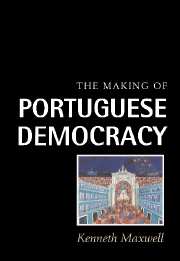Book contents
7 - Counter-revolution
Published online by Cambridge University Press: 24 November 2009
Summary
I'm telling you the elections have nothing to do with the dynamics of a revolution … I promise you there will be no parliament in Portugal.
Alvaro Cunhal (June 1975)… it was the election that turned the situation around.
Frank C. Carlucci, US ambassador to Portugal (1975–77), Congressional hearing (1976)Words like revolution, agrarian reform, popular power, nationalization, and praetorian power, etc., have of course a great mobilizing power and a value and political implication which I do not minimize; but alone, they are not enough to deal adequately with real situations.
Mário Soares (June 1975)Friend Boss: The people are with you. Out with the Union Committee. Death to the communists.
Anticommunist demonstration invading the offices of Têxtil Manuel Gonçalves, Famalicão (August 1975)As the situation in Angola deteriorated and the superpowers began to maneuver ominously but clandestinely in the interests of their African clients, international attention remained fixed on the struggles in Lisbon. Between March and November 1975 the fate of the revolution was settled and despite the left's apparently formidable assets in March 1975 – control of the administration, unions, army, the media, and political initiative – by the end of November the left was disunited, weakened, on the defensive, with its power broken. Why?
The answer lies in four aspects of those turbulent months.
- Type
- Chapter
- Information
- The Making of Portuguese Democracy , pp. 131 - 146Publisher: Cambridge University PressPrint publication year: 1995

